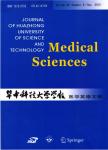Losartan Protects Podocytes against High Glucose-induced Injury by Inhibiting B7-1 Expression
作者机构:Department of UrologyZibo Central HospitalZibo 255036China department of Science and EducationZibo Central HospitalZibo 255036China Department of CardiologyShaanxi Provincial People's Hospital Xi'an 710068China Department of NephrologyZibo Central HospitalZibo 255036China
出 版 物:《Current Medical Science》 (当代医学科学(英文))
年 卷 期:2021年第41卷第3期
页 面:505-512页
核心收录:
学科分类:1002[医学-临床医学] 100201[医学-内科学(含:心血管病、血液病、呼吸系病、消化系病、内分泌与代谢病、肾病、风湿病、传染病)] 10[医学]
基 金:the National Natural Science Foundation of China(No.81400333)
主 题:B7-1 podocyte losartan diabetic kidney disease(DKD) PI3K 110a subunit angiotensin II type 1 receptor(ATI R)
摘 要:The role of B7-1 in podocyte injury has received increasing *** aim of this study was to investigate whether losartan protects podocytes of patients with diabetic kidney disease(DKD)by regulating B7-1 and the underlying *** with streptozotocin-induced DKD were treated with losartan for 8 *** changes in blood and urine were *** were isolated for electron microscopy,immunofluorescence,real-time quantitative PCR(RT-PCR),and Western blot *** mouse podocyte cells were cultured in normal or high glucose medium in the presence or absence of losartan for 48 h,and then the cells were collected for immunofluorescence,PCR,Western blotting and monolayer permeability *** phosphatidylinositol 3-kinase(PI3K)110a subunit and angiotensin II type 1 receptor(AT1R)plasmids were transfected into podocytes,respectively,and then Western blotting was performed to assess the expression of B7-1 *** results showed that losartan ameliorated podocyte structure and function in the rat model of DKD,and reduced the expression of B7-1 *** of PI3K 110a subunit in podocytes attenuated the inhibitory effect of losartan on B7-1 expression in high glucose-stimulated *** expression of B7-1 was significantly increased by overexpression of ATI R and significantly reduced by blocking PI3K 110a *** conclude that losartan protects podocytes against high glucose-induced injury by inhibiting AT1R-mediated B7-1 *** effect is dependent on the AT1R-PI3K 110a subunit pathway.



